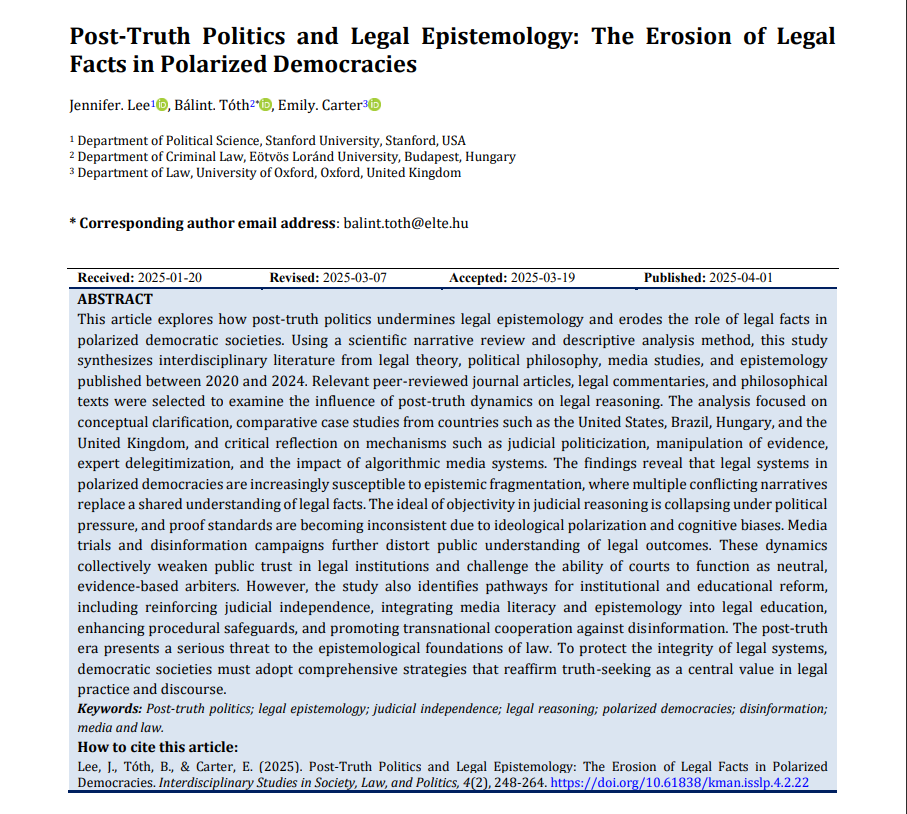Post-Truth Politics and Legal Epistemology: The Erosion of Legal Facts in Polarized Democracies
Keywords:
Post-truth politics, legal epistemology, judicial independence, legal reasoning, polarized democracies, disinformation, media and lawAbstract
This article explores how post-truth politics undermines legal epistemology and erodes the role of legal facts in polarized democratic societies. Using a scientific narrative review and descriptive analysis method, this study synthesizes interdisciplinary literature from legal theory, political philosophy, media studies, and epistemology published between 2020 and 2024. Relevant peer-reviewed journal articles, legal commentaries, and philosophical texts were selected to examine the influence of post-truth dynamics on legal reasoning. The analysis focused on conceptual clarification, comparative case studies from countries such as the United States, Brazil, Hungary, and the United Kingdom, and critical reflection on mechanisms such as judicial politicization, manipulation of evidence, expert delegitimization, and the impact of algorithmic media systems. The findings reveal that legal systems in polarized democracies are increasingly susceptible to epistemic fragmentation, where multiple conflicting narratives replace a shared understanding of legal facts. The ideal of objectivity in judicial reasoning is collapsing under political pressure, and proof standards are becoming inconsistent due to ideological polarization and cognitive biases. Media trials and disinformation campaigns further distort public understanding of legal outcomes. These dynamics collectively weaken public trust in legal institutions and challenge the ability of courts to function as neutral, evidence-based arbiters. However, the study also identifies pathways for institutional and educational reform, including reinforcing judicial independence, integrating media literacy and epistemology into legal education, enhancing procedural safeguards, and promoting transnational cooperation against disinformation. The post-truth era presents a serious threat to the epistemological foundations of law. To protect the integrity of legal systems, democratic societies must adopt comprehensive strategies that reaffirm truth-seeking as a central value in legal practice and discourse.
Downloads
References
Afif, F., Khasri, M. R. K., & Khasri, M. I. U. A. (2024). Post-Truth and Qur’an: Hacking the Truth Decay Through the Qur’anic Epistemological-Ethical Vision. Religia, 27(2), 162-195. https://doi.org/10.28918/religia.v27i2.8562
Arencibia, M. G., & Velázquez, M. R. H. (2021). A Critical Look at Post-Truth Thinking. History Research, 9(2), 118. https://doi.org/10.11648/j.history.20210902.13
Capilla, P. (2021). Post-Truth as a Mutation of Epistemology in Journalism. Media and Communication, 9(1), 313-322. https://doi.org/10.17645/mac.v9i1.3529
Cassam, Q. (2021). Bullshit, Post-Truth, and Propaganda. 49-63. https://doi.org/10.1093/oso/9780192893338.003.0004
Enroth, H. (2021). Crisis of Authority: The Truth of Post-Truth. International Journal of Politics Culture and Society, 36(2), 179-195. https://doi.org/10.1007/s10767-021-09415-6
Fischer, F. (2021). Truth and Post-Truth in Public Policy. https://doi.org/10.1017/9781108854344
Forberg, P. (2022). “No Cult Tells You to Think for Yourself”: Discursive Ideology and the Limits of Rationality in Conspiracy Theory QAnon. American behavioral scientist, 67(5), 649-664. https://doi.org/10.1177/00027642221091199
Harcourt, B. E. (2021). Post- Truth. 147-175. https://doi.org/10.18574/nyu/9781479811595.003.0007
Hartley, K. (2022). Frank FISCHER, Truth and Post-Truth in Public Policy: Interpreting the Arguments. International Review of Public Policy, 4(3), 377-381. https://doi.org/10.4000/irpp.3044
Holman, B. (2020). STS, Post-Truth, and the Rediscovery of Bullshit. Engaging Science Technology and Society, 6, 370-390. https://doi.org/10.17351/ests2020.265
Im, H.-B. (2024). The Sources of Discontent and Their Impact on the Retreat of Democracy in South Korea. European Journal of Korean Studies, 323-348. https://doi.org/10.33526/ejks.20242302.323
Kazakov, I. (2022). Discourse Construction of Political Reality in the USA: How Ideology Forms Facts. Pskov Region Studies Journal(4), 43. https://doi.org/10.37490/s221979310021821-6
Lutfi, M., & Ja’far, S. (2023). Islam, Cyberspace and Post-Truth: Epistemological Problems in the Digital Age. Al-a Raf Jurnal Pemikiran Islam Dan Filsafat, 20(2), 261-286. https://doi.org/10.22515/ajpif.v20i2.7937
Lynch, W. T. (2022). Does Post-Truth Expand or Restrict Political Choice? Politics, Planning, and Expertise in a Post-Truth Environment. Analyse & Kritik, 44(1), 137-159. https://doi.org/10.1515/auk-2022-2026
Pardede, J. N., & Poluakan, P. H. (2021). Law and Post-Truth: Critical Constructivism as an Ideal Legal Reasoning Method on Indonesia's Post-Truth Era Society. Volksgeist Jurnal Ilmu Hukum Dan Konstitusi, 4(1), 1-9. https://doi.org/10.24090/volksgeist.v4i1.4202
Prozorov, S. (2021). Subject to Truth. 53-89. https://doi.org/10.3366/edinburgh/9781474485784.003.0003
Raburski, T. (2022). Epistemologia Stosowania Prawa a Zasada Demokratycznego Państwa Prawnego. Archiwum Filozofii Prawa I Filozofii Społecznej, 39-51. https://doi.org/10.36280/afpifs.2022.4.39
Shashkova, L. (2021). Political Turn in the Philosophy of Science. Politology Bulletin(87), 14-23. https://doi.org/10.17721/2415-881x.2021.87.14-23
Sihombing, L. A., Darmawan, I., & Prayuti, Y. (2024). Social Media, Fake News, Information Manipulation and Democracy and the Challenges of Finding Legal Truth in the Post-Truth Era. Pena Justisia Media Komunikasi Dan Kajian Hukum, 23(2), 1263. https://doi.org/10.31941/pj.v23i2.4797
Ünal, D. (2024). Political Homophobia as a Tool of Creating Crisis Narratives and Ontological Insecurities in Illiberal Populist Contexts: Lessons From the 2023 Elections in Turkey. New Perspectives on Turkey, 71, 143-164. https://doi.org/10.1017/npt.2024.4
Valverde, R. C. (2023). Spain and the Old Regime of Post-Truth: Freedom of Speech, Ritualised Politics, and Postmemory on Social Media. Ethnologia Europaea, 53(2). https://doi.org/10.16995/ee.8911
Wimberly, C. (2021). The Birth of the Post-Truth Era: A Genealogy of Corporate Public Relations, Propaganda, and Trump. The Journal of Speculative Philosophy, 35(2), 130-146. https://doi.org/10.5325/jspecphil.35.2.0130
Zoglauer, T. (2023). Post-Truth Epistemology. 35-78. https://doi.org/10.1007/978-3-658-39942-9_2
Zulfikar, P. (2022). Epistomologi Kebenaran Terhadap Hukum. Juncto Jurnal Ilmiah Hukum, 4(1), 78-95. https://doi.org/10.31289/juncto.v4i1.1158

Downloads
Additional Files
Published
Submitted
Revised
Accepted
Issue
Section
License

This work is licensed under a Creative Commons Attribution-NonCommercial 4.0 International License.





